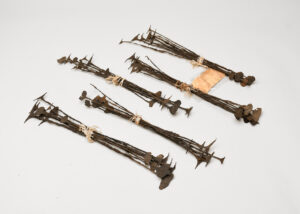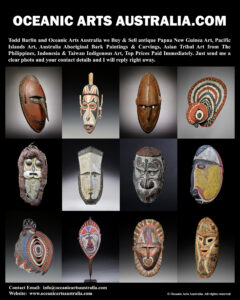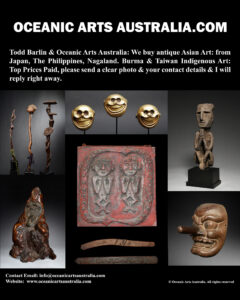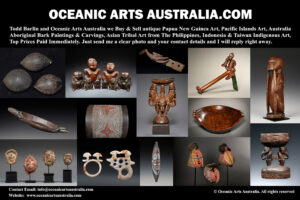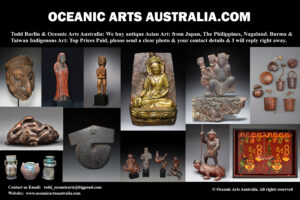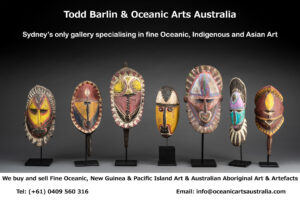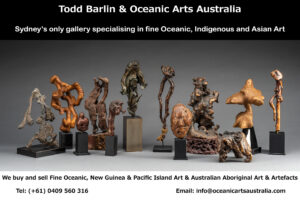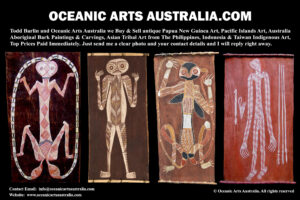Superb African Antique Kissi Penny Iron Currency Liberia Sierra Leone West Africa 19th C
| Collection No. | Kissi Iron Currency |
|---|---|
| Size | 40cm to 45cm |
Superb African Antique Kissi Penny Iron Currency Liberia Sierra Leone West Africa 19th Century
The Kissi Penny was an iron currency made in Sierra Leone that circulated widely near its production among Gbandi (Bandi), Gola, Kissi, Kpelle, Loma, Mandinka and Mende and other people of Liberia, Sierra Leone.
During the late 19th century, Kissi pennies were minted from the natural iron ore located in what is known today as Liberia, Serra Leone, and Guinea. Referred to by the Kissi people as Kilindi, the Europeans who colonized the region referred to them as Kissi pennies or Kissi money. During this time, Kissi pennies began to circulate in the African regions along with European and American paper money.
Kissi pennies are thin, twisted rods of high-quality iron with one end molded into the shape of a “T” called niling (ear) and the other end shaped into a flat spatula-like form called kodo (foot). One of the possible reasons for its unusual shape could be because it is almost impossible to alter or shave the penny without the tampering being noticeable.
Due to the unusual human-like shape, the Kissi people believed the pennies held souls. Rods vary in size from about 6’’ to 18’’ with longer ones being of higher value. Generally, Kissi pennies were fastened into bundles of twenty rods as a single Kissi penny was not worth much. There are different proposed explanations about why Kissi believed this currency held souls: the shape may resemble an abstract human form, and the iron-working process contains symbolic meanings. If a Kissi penny were to break, the loss of the soul devalued the penny. Only the Zoe, a trained blacksmith, could repair it, for a fee, the Zoe would rejoin the broken penny to restore the missing soul.
West Africans from the region of modern-day Liberia and Sierra Leone have used iron as a trading good and standard of value for a long time, Ironworking had developed in the region by ca. 600
Even after they were discontinued for use as currency, Kissi pennies continued to be employed in the society of the region, for example, as tokens of completing rituals in the Poro and Sande Societies; as bride wealth, and also to be placed on tombs and graves, where they were believed to channel the souls of the dead.
Provenance: Allen Christensen Collection 1908-1981 with original label
The Todd Barlin Collection of African & Oceanic Art
See my new EXHIBITIONS GALLERY showing the Museums and Art Galleries Exhibitions that I provided artworks for over the past 40 years. There is the link to the article about my artworks published in the prestigious Louvre Magazine in 1996
I have artwork for Museums and art Galleries but also for collectors at every stage of their collecting. I want to encourage people to explore the fine art of New Guinea & West Papua and the Pacific Islands and to be able to see and touch the artworks in a relaxed and friendly manner in my Sydney Gallery. I would like to invite you to visit my gallery and see the artworks in person and also look at my website www.oceanicartsaustralia.com where there are many Galleries & Sub Galleries to explore.
My Gallery of nearly 40 years is the last physical gallery in Sydney that specializes in New Guinea and Oceanic Art. Sydney is very close to New Guinea & the Pacific Islands where all of these amazing artworks came from, Australia’s closest neighbors.
To see many more rare items and the finest masterpieces, please make an appointment with us to visit the gallery.
For all inquiries, please contact us

